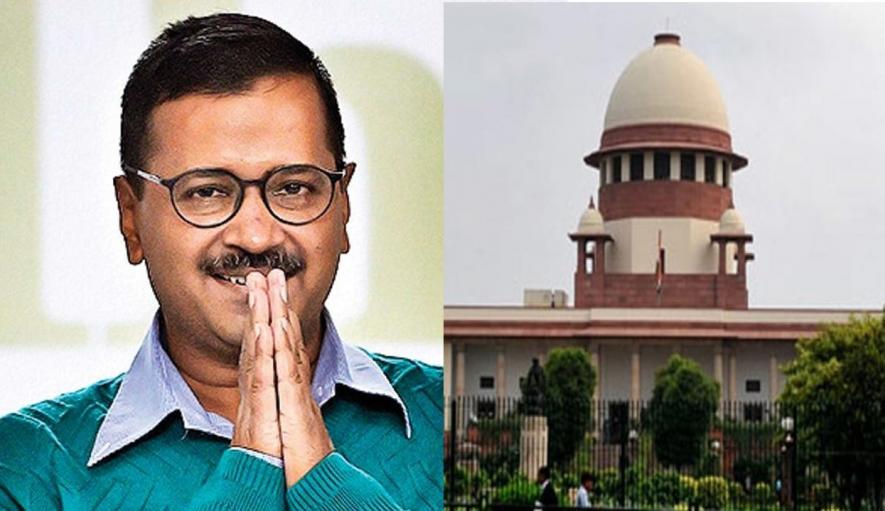Delhi Lieutenant Governor Bound by Government’s Advice, says Supreme Court

The Supreme Court of India today delivered its verdict on the tussle between the Aam Aadmi Party Government of the National Capital Territory (GNCT) of Delhi and the Lieutenant Governor (LG). The consensus of the Constitutional Bench comprising Chief Justice of India Dipak Misra and Justices Ashok Bhushan, DY Chandrachud, AK Sikri and AM Khanwilkar was that the scheme of governance for the National Capital Territory (NCT) should be that of a partnership between the LG and the GNCT. The Court, while refusing to accept the claim that Delhi was a full-fledged State, nonetheless declared that the LG was bound by the aid and advice of the government. The court added that the executive powers of the GNCT should be co-extensive with legislative powers.
This decision arose from several appeals to the Supreme Court - an appeal on a contempt petition, a writ petition, a criminal appeal and seven civil appeals. The issue before the Court concerned the extent of the LG's powers vis-à-vis the functioning of Delhi's government. It began with a conflict of opinion regarding how the LG's role is to be conceived. The contention raised by the LG and the Union of India in the matter was that, that although Article 239AA constitutes a Legislative Assembly for the NCT of Delhi, the President shall remain its Executive head, acting through the Lieutenant Governor. They further stated that the powers of Parliament regarding Union Territories shall not be affected in any manner by Article 239AA.
Article 239AA is the constitutional foundation for the GNCT of Delhi. It not only constitutes the legislative assembly but also lays down the extent of the legislative powers of the assembly, as well as the extent of the executive powers of the GNCT of Delhi.. Under the Article, the assembly is empowered to make law on all matters in the state and concurrent lists in Schedule VII of the Constitution of India, except for matters pertaining to land, police, and the maintenance of law and order. However, according to the LG's interpretation, the LG has absolute discretionary power.
The GNCT of Delhi, on the other hand, contended that the NCT of Delhi has some characteristics of a state, as well as those of a union territory. This arises as the NCT of Delhi enjoys wider powers than is accorded to other Union Territories. They further contended that the system of functioning bestowed by Article 239AA follows the Westminster model. They also mentioned that since the Council of Ministers is to 'aid and advise' the LG – which is the phrase used for Governors of states – instead of 'assist and advise', it implies that the discretionary power of the LG is curtailed. The appellants further contended that just because the Constitution of India permits a difference of opinion between the Council of Ministers and the LG, it does not mean that the aid and advice rendered is not binding.
The LG and the Union of India had attempted to draw parallels between the NCT of Delhi and the Union Territory of Puducherry. They claimed that the provisions for the two were similar and hence, the LG should exercise the same powers as the Governor of Puducherry. The Supreme Court, however, stated that “Puducherry cannot be compared with the NCT of Delhi as it [Puducherry] is solely governed by the provisions of Article 239A.” The Court evidently took note of the fact that the two Union Territories are governed under separate Constitutional provisions.
The Supreme Court referred to the judgement delivered in New Delhi Municipal Corporation v State of Punjab wherein Justice BP Jeevan Reddy stated that “a reference to Article 239B read with Clause (8) of Article 239AA shows how the Union Territory of Delhi is in a class by itself but is certainly not a State within the meaning of Article 246 or Part VI of the Constitution. In sum, it is also a territory governed by Clause (4) of Article 246.” What this reference means is that though under 239B, the LG can pass ordinances for the NCT of Delhi, Clause 8 of Article 239AA makes its application dependent on the prevailing circumstances of the NCT of Delhi. Further, the NCT of Delhi is also governed by the provisions governing states. However, in the present case, the Court did mention that “the Council of Ministers being headed by the Chief Minister should be guided by values and prudence accepting the constitutional position that the NCT of Delhi is not a State.”
After analysing the existing laws regarding the NCT of Delhi, the Supreme Court stated that the LG can act in his discretion only in matters which are beyond the powers of the legislative assembly or are delegated to him by the President. The Court when perusing Section 49 of the Government of National Capital Territory of Delhi Act, 1991 – which states that the LG and the GNCT of Delhi are under the general control of the President – stated that “the set up in the NCT of Delhi is one where the Council of Ministers headed by the Chief Minister on one hand and the Lieutenant Governor on the other are a team, a pair on a bicycle built for two with the President as its rider who retains the general control. Needless to say, the President, while exercising this general control, acts as per the aid and advice of the Union Council of Ministers.”
The Court, when looking into the nature of the relationship between the LG and the GNCT of Delhi regarding the GNCT's obligation to inform the LG, noted that “the Council [of Ministers] is only required to communicate and inform its various proposals, agendas and decisions to the Lieutenant Governor so as to keep him apprised and to enable him to scrutinize the said proposals, agendas and decisions in order to exercise his powers”.
Thus, the Court concluded that “[t]he status of NCT of Delhi is sui generis, a class apart, and the status of the Lieutenant Governor of Delhi is not that of a Governor of a State, rather he remains an Administrator, in a limited sense, working with the designation of Lieutenant Governor.” The Court further laid down that the executive power of the GNCT of Delhi is 'co-extensive' with the assembly's legislative powers. However, if Parliament were to enact any law contained in the state list or concurrent list beyond the three matters excluded from the GNCT of Delhi and the assembly's jurisdiction, then it can do so as it is constitutionally empowered. The Court further stressed that the LG is bound by the aid and advise of the Council of Ministers or any direction he is given by the President. The LG has not been granted wide discretionary powers. The Court then observed that the Transaction of Business Rules, 1933 – which provides for the GNCT of Delhi's functioning – mandates that a difference of opinion between the LG and the Council of Ministers must be resolved by dialogue and discussion. The Court also noted that the communication that should be made to the LG is in the nature of keeping the LG informed of the policy decisions adopted by the Council of Ministers.
Thus, one may say that the Court's decision in the matter only highlighted the extent of the respective powers of the LG and the GNCT of Delhi as had already been laid down in law. Further, the Court has recommended dialogue as the mode of redressing differences of opinion between the two.
Get the latest reports & analysis with people's perspective on Protests, movements & deep analytical videos, discussions of the current affairs in your Telegram app. Subscribe to NewsClick's Telegram channel & get Real-Time updates on stories, as they get published on our website.
























